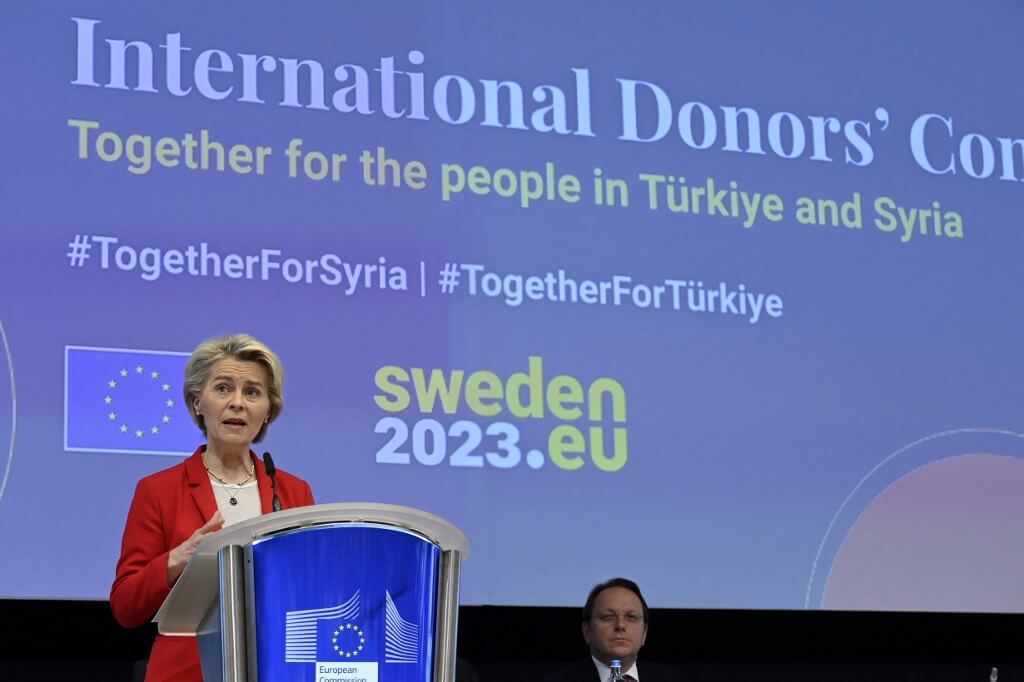Donors on Monday pledged seven billion euros to help Turkey and Syria recover from last month’s devastating earthquakes, as Ankara set the bill for rebuilding at well over 10 times that figure, Agence France-Presse reported.
An EU-hosted conference sought to generate funds six weeks after the 7.8-magnitude quake that killed over 55,000 people across southeastern Turkey and parts of war-torn Syria.
Turkish President Recep Tayyip Erdoğan told those gathered in Brussels that damage to his country was estimated at around $104 billion (96 billion euros).
“Regardless of its economic standing, it is impossible for any country to fight a disaster of this scale on its own,” he said via video link from Turkey.
The United Nations has set the “recovery costs” for Syria at $14.8 billion.
Sweden’s Prime Minister Ulf Kristersson, who co-chaired the event, said the seven-billion-euro pledge sent “one main message, that the people affected are not alone.”
European Commission President Ursula von der Leyen said of the total pledged, 950 million euros would be to help people in Syria.
“The needs of the survivors are still massive and must be tackled with urgency,” she said.
Von der Leyen had kicked off the fundraising by promising one billion euros for reconstruction in Turkey and 108 million euros for humanitarian aid in Syria.
The earthquake levelled cities and displaced millions. Flash floods last week in the region only added to the misery.
Aid groups had urged donors to step up their commitments after the UN complained of the poor level of response to a call it made in mid-February for urgent funding.
Achim Steiner, a senior official at the United Nations Development Program, called the new pledges a “major step forward”.
“It is very welcome, but in terms of the overall recovery and reconstruction we still have a long way to go,” he told AFP.
Germany said it was doubling its support for the quake victims to 240 million euros, and France promised an additional 12 million euros.
Turkey is a key partner for the EU even if ties are often strained, and the bloc already gives billions in aid to help its eastern neighbor house refugees from Syria’s 12-year war.
Syria ‘deplores’ conference
The government of Syrian President Bashar al-Assad, sanctioned by the West since the brutal crackdown that sparked the ongoing civil war, was not invited to the event.
The foreign ministry in Damascus said it “deplores” the holding of the conference in Brussels without the involvement of the Syrian authorities.
While international rescue teams and aid flowed quickly to Turkey, humanitarian organizations faced major hurdles reaching stricken areas in northern Syria.
UN investigators say the area became the “epicenter of neglect” as the warring factions and hesitancy by the international community held up desperately needed aid.
Aid has belatedly begun reaching the stricken areas in northern Syria, and the EU and United States eased sanctions to try to speed up deliveries.
Moutaz Adham, Oxfam’s director for Syria, said the fresh pledges could “be a lifeline for many Syrians who were already struggling with hunger, skyrocketing inflation and poverty when disaster hit.”
“But we need a long-term solution that goes beyond just humanitarian aid,” Adham said.
While the Syrian authorities were excluded from the event, Assad has been receiving humanitarian aid from Arab leaders in the aftermath of the quake, in a move analysts say could be the start of improved ties.
He made his second visit since the quake on Sunday to the United Arab Emirates, which has already pledged more than $100 million in assistance.
Assad’s key backer Russia was not invited to the Brussels conference because of the war Moscow launched against Ukraine.

